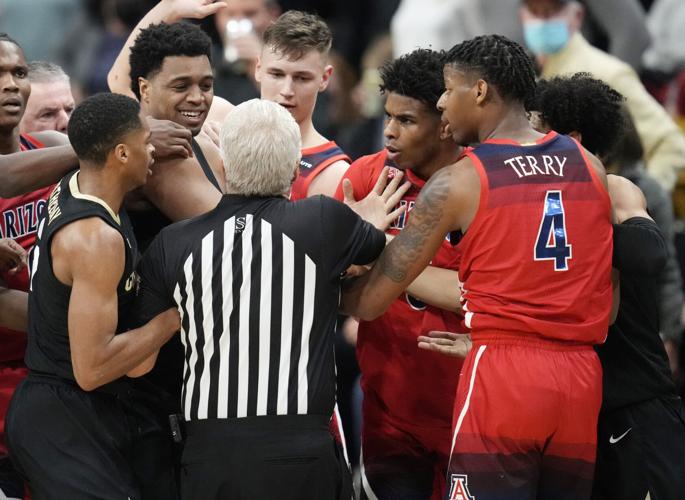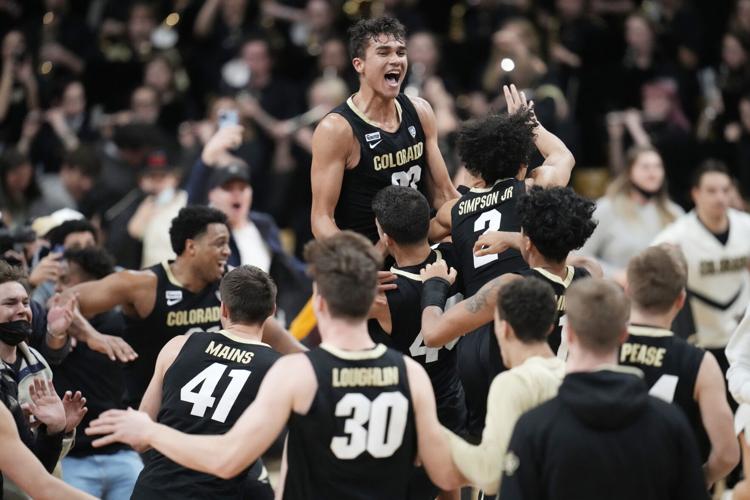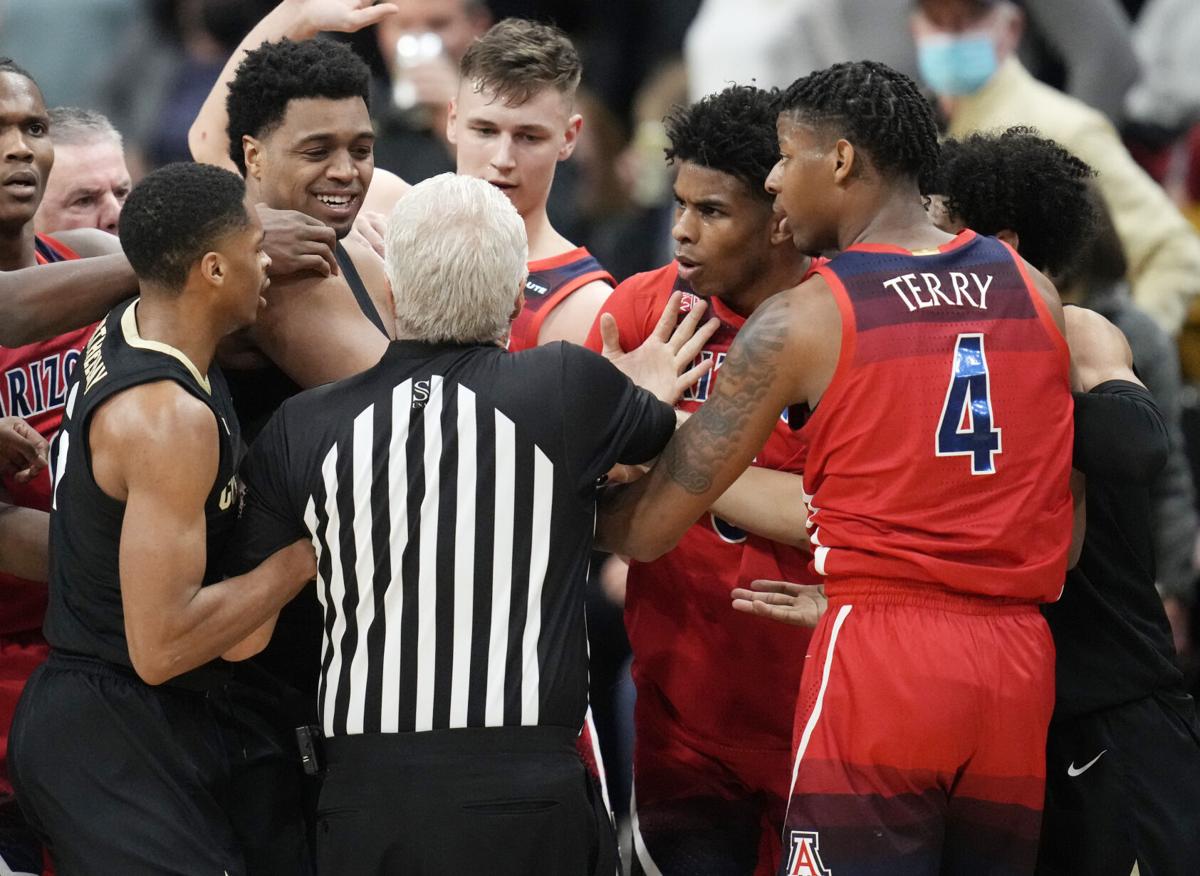BOULDER, Colo. — While the Wildcats quietly exited a tight corridor of the CU Events Center on Saturday night, having suffered their worst of three losses during an otherwise magical season, Arizona president Robert C. Robbins and a small group of staffers were keeping an eye on the Oregon-USC score.
A win by the Ducks would have still allowed the Wildcats to clinch a share of the Pac-12 regular-season title.
That didn’t work out, either.
Arizona’s 79-63 loss at Colorado, coupled with the No. 16-ranked Trojans’ 70-69 win over the Ducks in Eugene, meant the Wildcats will have to do it the hard way — by beating USC at the Galen Center on Tuesday — if they want to wrap up the conference before hosting Stanford and Cal next weekend.
“Bring it on,” UA coach Tommy Lloyd said.
The No. 2 Wildcats (25-3, 15-2) are still likely to win the Pac-12, of course, having a two-game lead in the loss column over USC (25-4, 14-4) with three games to play. (The Trojans play Arizona on Tuesday and at UCLA on Saturday).
That means even if Tuesday doesn’t work out for the Wildcats, all they have to do is beat Stanford or Cal at home to clinch a tie (and a Stanford-Cal sweep, or one UA win plus a USC loss at UCLA would give UA the title outright).
But the Wildcats have other things to worry about. Losing to USC could further damage UA’s chances of earning a No. 1 NCAA Tournament seed. Regardless of what seed the Wildcats get, there were some red flags at Colorado that could cost Arizona much more dearly if they reappear during the NCAA Tournament.
Among them:
1. Christian Koloko was neutralized
The potential conference defensive player of the year played just 22 minutes while struggling with fouls, scoring four points on 1-for-4 shooting while collecting five rebounds but blocking only one shot. He also had three turnovers.
It was somewhat reminiscent of UA’s 77-73 loss at Tennessee on Dec. 22, when Koloko had just four points in 19 minutes while he and Azuolas Tubelis both struggled with fouls.
It won’t be a surprise if future UA opponents try to incorporate those two game videos into their scouting reports.
“Christian’s a really good player and I think teams know that,” Lloyd said. “The only chance they’ve got is to be really physical with him and then hope that the game’s called as such and that’s exactly what happened. I’m not complaining about the refs, because it’s probably called like that at both ends. That’s just how it goes.”
Colorado coach Tad Boyle said Colorado wasn’t necessarily going after Koloko but wanted to attack the paint and force Koloko into some tough decisions.
“We wanted to do is go at Koloko in the ball screens because he kind of stays in that lane and your guards can get downhill,” Boyle said. “Then he’s got to make a decision: ‘Do I stay on the guard or do I guard that big who’s rolling to the basket?’”
As it turned out, Arizona actually took seven more free throws than Colorado, making 18 of 22 to gain an extra five points at the line over the Buffs (who were 13 of 15). But the points in the paint differential and the Wildcats’ rebounding deficit of 35-33 — against a much smaller team — were statistical evidence of CU’s advantage in toughness.
“We got beat by a better team that probably wanted it a little bit more than we did today and played a little bit harder,” Lloyd said.
2. CU could rim-run, too
Even with Tubelis collecting 15 points and eight rebounds, the Buffaloes managed to dominate the paint despite having nobody bigger than 6-foot-9. But those two 6-9 combo forwards, Tristan da Silva (19) and Jabari Walker (15), combined for 34 points.
Da Silva said Boyle emphasized how good the Wildcats are at shot blocking and emphasized the need to pump fake and “taking it to the chin” on layups.
“That puts pressure on them and not on us,” da Silva said.
The Buffs also took some lessons from their 76-55 loss to Arizona on Jan. 13 at McKale Center, when they trailed just 32-28 at halftime but then fell apart. In particular, Walker said he learned from watching the rim-running of the Wildcats’ bigs in that game.
On Saturday, Walker finished with 15 points on 6-for-12 shooting while collecting 14 rebounds.
“I tried to take that as a skill set learned from my opponent and apply it to my game — just hurry up and get the ball out and run because it puts a lot of pressure on the defense,” Walker said. “I was back in transition after every shot went up. I was trying to get the bigs to relocate and move my feet, swivel and force them to the shoulder that they don’t like shooting over — everything we talked about on the scouting report.”
3. Bennedict Mathurin was stopped in his tracks
After leading UA with 12 points on 3-for-8 shooting in the first half, Arizona’s leading scorer was held scoreless in the second half, taking only three shots and missing all of them.
He wasn’t alone. Guard Kerr Kriisa missed all four 3-pointers he attempted in the second half and finished 1 for 6 after hitting seven 3-pointers on Thursday at Utah. The Wildcats shot 37.0% overall in the second half Saturday.
Asked if the Buffs were doing anything specific against Mathurin, Lloyd responded in general terms.
“They were just doing a good job pressuring us and they switched a bunch of things and then they didn’t switch things,” Lloyd said. “They kind of were able to take a little bit of our thrust away.”

Colorado forward Tristan da Silva, top, celebrates with teammates as time runs out in Saturday's win over No. 2 Arizona.
4. The Wildcats’ usual energy and composure went missing
Lloyd is one of many coaches who won’t talk about the mile-high, breath-sapping altitude at the CU Events Center. “Don’t acknowledge it,” Lloyd said last week.
It is also possible some human nature crept into the Wildcats, who didn’t need Saturday’s game nearly as much as the Buffs, who were coming off a bad 17-point loss to ASU on Thursday and in desperate need of a résumé-building win.
But whatever the cause, Arizona faded down the stretch Saturday.
The Wildcats led 37-32 at halftime but Colorado immediately came out stronger on both ends of the floor. Keeping UA to just 35.3% shooting over the first 12 minutes of the second half while shooting 65.0% itself, Colorado erased UA’s lead less than three minutes into the half.
The Buffs then went on a 9-2 run to take a 54-46 lead by the time former UA signee K.J. Simpson stole the ball from Justin Kier and raced downcourt for a layup with 16:22 left.
The Wildcats’ frustrations appeared to hit a peak with 4:20 left in the game, when Colorado center Evan Battey pulled down a missed 3-pointer from Kier only to have several Wildcats battle him for the ball while he cradled it tightly and smiled. Officials reviewed the play, in which guard Dalen Terry appeared the most aggressive, but only called a personal foul on Terry.
Lloyd shrugged that incident off.
“It was a scrappy game and you know, and Evan Battey is a really good player, and he’s always in a bunch of these little melees,” Lloyd said. “Nothing against him. He’s a good player and a super nice guy. So, I mean, things happen.”
Colorado went on to a 9-0 run after the play, getting a 3-pointer from da Silva with 1:53 left that gave Colorado a 75-59 lead and the Buffs coasted to the end, with fans swarming the entire floor afterward.
The Wildcats escaped to their locker room on the other side of a yellow rope from the fans, and Kier said he hopes they remember the moment.
“That’s what I was telling the guys: ‘Soak this in. It’s not a bad thing to soak this in and be angry,’” said Kier, who is now in his sixth year of college basketball. “Because that’s gonna add fuel to the fire when we try to close out this this regular season and head into March.
“So we’re gonna be fine.”






